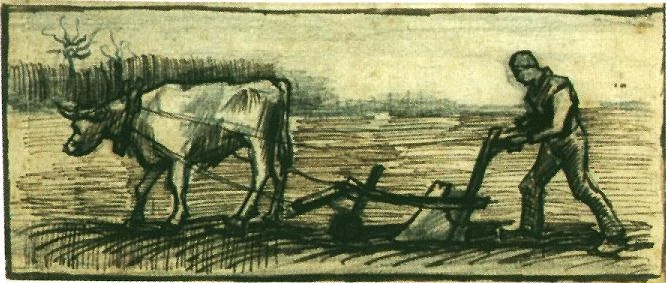
Jesus said to him, ‘No one who puts his hand to the plow and looks back is fit for the kingdom of God.’ – Luke 9:62
I defy the Pope and all his laws. . . . If God spare my life ere many years, I will cause a boy that driveth the plow, shall know more of the Scripture than thou dost. – William Tyndale
What is the man’s chief end? In the very well-known words of the Westminster Shorter Catechism, “To glorify God (Ps. 86:9; Isa. 60:21; Matt. 6:9-13; Rom. 11:36; 1 Cor. 6:20; 10:31; Rev. 4:11) and to enjoy Him forever (Ps. 16:5-11; 144:15; Isa. 12:2; Luke 2:10; Phil. 4:4; Rev. 21:3-4).”1 But by what standard are we to know how to do this? The Catechism tells us, “The Word of God, which is contained in the Scriptures of the Old and New Testaments ( Matt. 19:4-5 with Gen. 2:24; Luke 24:27, 44; 1 Cor. 2:13; 14:37; 2 Pet.1:20-21; 3:2, 15-16), is the only rule to direct us how we may glorify and enjoy him (Deut. 4:2; Ps. 19:7-11; Isa. 8:20; John 15:11; 20:30-31; Acts 17:11; 2 Tim. 3:15-17; 1 John 1:4).”1 This is what drove the likes of Tyndale to defy popes and emperors: God is a covenant God who desires the worship and communion of His people. This was worth to him his very life, which went up in flames on October 1536.
How is man to know the grand narrative of God’s world: That He as Lord and King benevolently created all things, even man, and in his sin provided the gracious promise of the Messiah (Gen. 3:15)? How will people know that they owe allegiance to this King, but “all have turned aside; together they have become worthless” and “no one does good, not even one” (Rom. 3:12)? But more importantly, how will they know that, in the words of the heavenly Dr. Richard Sibbes, “there is more mercy in Christ than sin in us”?
The men mentioned in this post lived closer to an era where the Scriptures had been hidden, locked away in darkness from the layman. The Scriptures were not to be understood, not to be heard in your own language, and not ever to be within your grasp. Whatever was mediated to the people (i.e.: the sacraments) was all you could hope to partake of from God’s table. It was those pre-Reformation Christians and those after that would unleash, in Charles Spurgeon’s words, “God’s lion,” his word, to all, even ploughboys.
These men also understood the Lord’s words in Luke 9 regarding counting the cost of pledging oneself to the King’s kingdom. His audience was one well versed in agriculture. If once plowing began a worker looked away, the line could become crooked, and the work rendered inefficient. Furthermore, “putting the hand to the plow” is an expression indicating the beginning of a work that cannot be turned back on, or else the result would affect the product (i.e.: the harvest). God’s work requires not just committed people, but born-again, regenerated, Spirit-indwelt Christians in a constant state of reformation. Someone who claims to be a Christian and yet looks back on the world and returns to it may well be someone who was never a member of God’s kingdom in the first place (1 Jn. 2:19).
What is interesting is that Jesus sought primarily the laymen, not the distinguished and rich, although his gracious heart was most definitely not closed to them (Luke 19:1-10; Mark 10:17-31). He addressed those without repute and standing in their society and said: You too are called to repent and pledge your allegiance to God.
These are just the ruminations of a layman, a “ploughboy.” The author is not a pastor, a church elder, a professor, or a professional. Yet, in Christ, every ploughboy is a royal son or daughter entrusted with the stewardship of their particular lot in this life. It is the author’s hope that these pebbles may serve as means of grace to God’s laymen, even just one. As a Christian husband and father, family shepherd and governor of a home, it is all the more important to train, develop, and pass on the knowledge and practice of God’s kingdom, from ploughboy to ploughboy, and never look back. –

